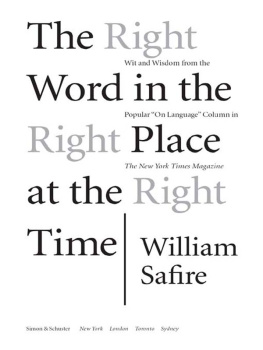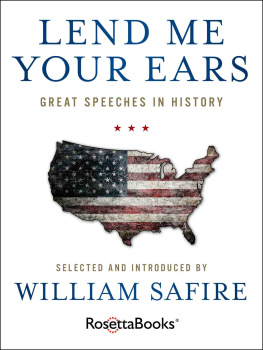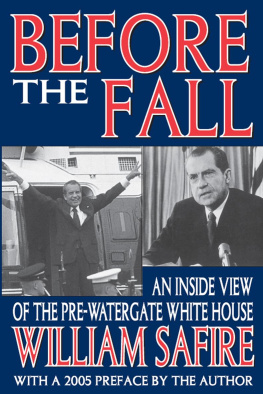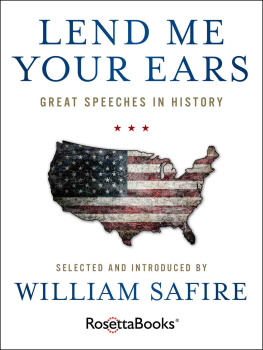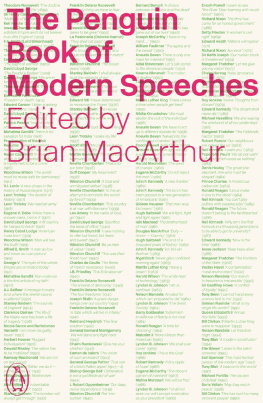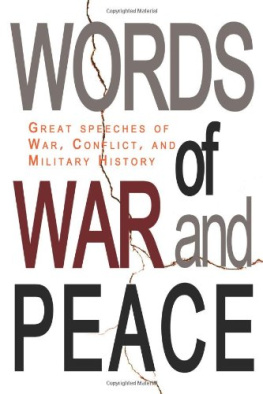Lend Me Your Ears
Great Speeches in History
selected and introduced by William Safire
Copyright
Lend Me Your Ears
Copyright 1992, 1997, 2004, 2014 by William Safire
Cover art, special contents, and Electronic Edition 2014 by RosettaBooks LLC
All rights reserved. No part of this book may be used or reproduced in any form or by any electronic or mechanical means, including information storage and retrieval systems, without permission in writing from the publisher, except by a reviewer who may quote brief passages in a review.
Cover jacket design by David Ter-Avanesyan/Ter33Design
ISBN Mobipocket edition: 9780795336607
TO
JUDSON WELLIVER,
first White House speechwriter
(Harding and Coolidge administrations), and members of the Judson Welliver Society, the association of former White House speechwriters
CONTENTS
Preface
A Curator at the National Archives in Washington called one day and invited me over to take a look at a new exhibit before it opened. The archivist said there was an item in its American Originals presentation that would surely intrigue me.
So I went. There in the rotunda was the usual stuff: an early copy of the Magna Carta and one of the few copies of the Emancipation Proclamation in Lincolns handwriting. Over on the side were some interesting curiosities: the canceled check for $7.2 million that purchased Alaska from Russia, along with John Waynes World War II application to go to work for the OSS, our nascent spy agency.
But what grabbed my attention was a two-page typescript displayed in a glass case next to Lincolns work. It was a memo from me when I was a White House speechwriter, dated July 18, 1969, when everyone was excited about our incipient landing on the moon. The subject line read In the Event of Moon Disaster. It included a draft of a short speech that President Nixon would have made if the astronauts of Apollo XI were stranded on the moon and had to close down communication lest the peoples of the world would have to agonize with them as they starved to death. The somber speech was never delivered, of coursethe moon shot initiated in the Kennedy era was a triumph for the United States and all mankindbut it had been filed away, forgotten for three decades until a reporter found it while digging around in the archives. The document has become one of the odd artifacts of that historic day, a sobering reminder of the risk the crew ran (and tragedy did strike a space shuttle crew years later). I include it at the end of the updated edition of this anthology in a new section of undelivered speeches, along with quite different addresses drafted by or for Presidents Kennedy and Clinton that they did not use.
What struck me, peering down through the unbreakable glass into the case containing my treasured curiosity, was this question: When did a speech become a speechwhen it was drafted or when it was given? The answer came just as quickly: Words on a page do not a speech make. Nor is a script a play, nor a screenplay a movie. What makes a draft speech a real speech is the speaking of it; but without that articulation, without the strong presence of the deliverer, without the audience to be aroused or moved, all you have is a polemic on a page. A speech is an event.
I looked to my right, at the larger glass case with the guard standing next to it. The document in it was no speech, either, and was not even much of an inspirational piece of writing; one eminent historian said its words had all the moral fervor of a bill of lading. Lincoln, the greatest presidential speechwriter of all, chose to put his proclamation in sere, legalistic language because no fanfare was needed for such a monumental change of national direction. The stunning extension of human freedom, not to mention the largest seizure of property in history, was thunderbolt enough.
What if there had been television and streaming media and the Internet back in 1863? The wartime president could not have avoided presenting his unprecedented executive act of emancipation in a speech to the divided nation. If you are interested in speechwriting as an art form or in speech viewing as an actively involved member of an audience, take a crack at drafting such a speech. Your purpose is to rally your war-weary North to a greater cause than Union, which is wearing thin, and to stop antislavery Europe from trading with the South; at the same time, you do not want to trigger a bloody slave rebellion or lose border states or preclude peace negotiations with Confederate leaders. Your policy decision, after much private agonizing, had been made: to free the slaves in all states in rebellion, but not to free those in the slaveholding border states that did not secede. Now explain that in a speech to the nation in a way that advances all your morale-building, military, diplomatic, and moral goals.
Standing in that rotunda with its incongruous juxtaposition of writings on display, and turning that imaginary assignment over in my mind, this recovered speechwriter confronted the larger question, one of special interest to the reader hefting this volume: What is the single most important element in turning a speech into a memorable event? Is a great speech created by the dramatic occasion, or the persuasive style of the orator, or the eloquence of the words themselves?
Heres the answer:
The astute reader will note that the previous declarative sentence ends with a colon. The purpose of a colon is to signal a dramatic pause and point to whats coming next. And yet, nothing but this interruption follows Heres the answer: (it is not because I do not have an answer).
The even more astute reader will readily grasp the writerly manipulation under way. This is the preface to the third edition of an anthology of great speeches. Its primary purpose, like that of the book it introduces, is to instruct and inspire, largely by example, those interested in speechmaking, speechwriting, and speech listening. (A secondary purpose is to provide a doorstop-sized reference for students of history and politics who want to examine primary sources beyond quotation-book snippets, which is probably why it has a wider readership than any of my language books or novels.)
The best way to begin an informal speech that does not deal with a crisis or tragedy is to tell a little story. If the anecdote is amusing, finethat wakes up or relaxes an audience, whichever is requiredbut most attempts at humor from the lectern by noncomedians lay an egg. More reliable is a story about something poignant or instructive that has happened to youneither funny nor tragicand that connects to the theme of your speech. It gets personal without getting personal.
In these introductory words, the visit to the Archives about the moon-shot draft speech was such an opening. They led quickly to the point about a speech being an event rather than a script and set up the imaginary Lincoln speech proclaiming emancipation. From there it was an easy transition to internal dialogue asking about the relative importance of occasion, presentation, and content. If this were a speech (and its notI used that device in the intro to the first edition, which follows this preface) we would be six or seven minutes along the way, and youd want the answer to the relative-importance question.
Now heres my answer: Great speeches are made on occasions of emotional turmoil. The occasion can be a political victory or concession speech, a eulogy of a beloved figure, a summation at a murder trial or political show trial; it can be a prime ministers rallying a nation threatened by invasion or a presidents consoling a nation after a disaster.
The next most important element in the formation of a speech deemed great is the forum. This can be a joint session of Congress or a national convention, an academic ceremony or a testimonial dinner, a battlefield or a deck of an aircraft carrier, a pulpit or a gallows or a grave. Such moments and such places cry out for momentous addresses and imbue efforts toward them with solemnity or at least seriousness. The newsworthy setting adds respect for the words just as the tradition-filled halls dramatic echoes lend gravitas to the speakers message.
Next page

